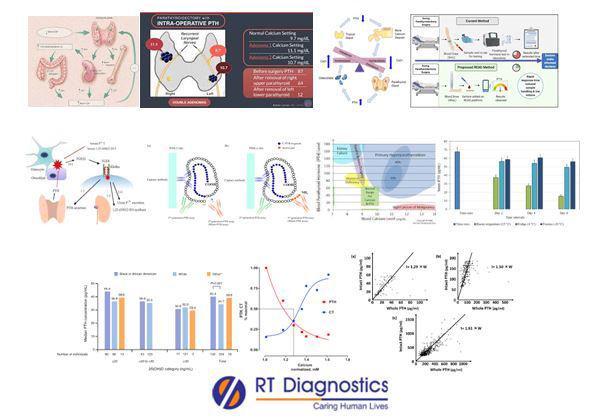PTH – Intact – Parathyroid Hormone:
Why PTH-Intact Parathyroid Hormone Test?
CLINICAL INFORMATION
A blood and urine calcium test is ordered to screen for the diagnosis and to monitor a range of conditions related to the bones, heart, nerves, teeth and kidneys. It is also ordered in patient with symptoms such as parathyroid disorder, mal-absorption or/and overactive thyroid. Calcium is one of the most important minerals in the body for the normal physiological functioning of nerves, muscles, and heart. Normal physiological levels of calcium are required for heart function, muscle contraction, nerve signalling and blood clotting. Normal levels of calcium when gets altered to either high or low levels of calcium, may reflect as a sign of bone diseases, thyroid disease, parathyroid disease, vitamin D disorders, kidney diseases or other related pathologies. Clinical manifestations of high calcium levels include increased thirst, frequent urination, mental changes like confusion, muscle twitching, muscle weakness, nausea, constipation, digestive upset etc. signs and symptoms of low calcium include muscle cramps, dry skin, brittle fingernails, seizures, abnormal heart rhythm, tingling sensation in the lips, fingers, feet etc. In the diagnosis of calcium-related disorders, two tests are performed – ionized calcium and total calcium, where parathyroid plays a key role. Para-thyroid glands are two pairs of small (size of a pea), oval-shaped glands situated next to the two thyroid glands (lobes) in the neck. This para-thyroid gland secretes a parathyroid hormone which plays a vital role in calcium metabolism (calcium levels in the blood), phosphorous, vitamin D etc. When especially, the blood calcium levels fall too low (inadequate) the parathyroid glands are triggered to secrete a parathyroid hormone to secrete restore blood calcium levels in the body. The functions of parathyroid hormone include the release of calcium by bones into the bloodstream, absorption of calcium from food by the small intestines, regulation of calcium (through vitamin D by the kidneys) etc. Thus the abnormalities of parathyroid hormone are characterized by alterations in the blood calcium levels and bone metabolism derangement. Pathologies of the para-thyroid hormone arise either due to excessive(Hyper-para-thyroidism) or diminished/inadequate (hypo-para-thyroidism) secretion of the parathyroid gland. Hence the para-thyroid hormone test result reflects accordingly as either excessive or deficient the functional activity of the parathyroid gland. Hypo-para-thyroidism is a state of decreased secretion or activity of parathyroid hormone, hence it leads to decreased blood calcium levels (hypocalcemia) and increased levels of phosphorous levels in the blood. The main cause of hypo-para-thyroidism is due to congenital hypo-para-thyroidism, acquired hypo-para-thyroidism (auto-immune disorder), thyroidectomy (the removal of parathyroid glands within the thyroid gland in a thyroidectomy surgery) or para-thyroid surgery (para-thyroidectomy) etc. Clinical manifestations of hypo-para-thyroidism may vary from mild tingling of hands, fingers, and around the mouth to severe muscle cramps (tetany) of the entire body which may lead to complications such as convulsions. Hyper-para-thyroidism is a pathological condition characterized by over-activity of the parathyroid gland. Primary hyper-para-thyroidism occurs when there is a disorder of the parathyroid gland itself. Hence primary hyper-para-thyroidism results in increased secretion of parathyroid hormone secretion resulting in excessively elevated levels of calcium (hypercalcemia). Thus in chronic untreated stages, these excessive calcium and phosphorous excretion have a high probability of the formation of renal calculi (kidney stones). Secondary hyper-para-thyroidism is an abnormal condition where the other causes of pathology (eg. kidney failure) affect the parathyroid gland to produce excessive parathyroid hormone. Few causes of hyper-para-thyroidism include hyperplasia of the para-thyroid gland, adenoma (benign tumour) of the parathyroid gland. Clinical manifestations of hyper-para-thyroidism include weakness, fatigue, depression, body aches etc. Para-thyroid hormone tests are performed to diagnose abnormal calcium levels such as hyper-calcemia, hypo-calcemia, abnormal levels of phosphorous, tetany, hypo-para-thyroidism, hyper-para-thyroidism, to monitor kidney diseases, prognosis, cancers of the para-thyroid hormone, hyperplasia of the para-thyroid hormone due to nodule, congenital hypo-para-thyroidism, acquired (auto-immune disorder) hypo-para-thyroidism, to monitor para-thyroidectomy or thyroidectomy, kidney failure, osteoporosis etc. Additional tests include calcium, vitamin D etc. Other tests include CBC, imaging studies etc.

General Instructions:
Sample Requirement: Specimen - Blood sample collected from the vein. Test Preparation: None.
NOTE - Sample for specimen collections may vary based on the patient’s condition/cases according to the patient’s presenting complaints/signs or symptoms:
SPECIMEN REQUIREMENT (Special or Rare Cases) - As instructed and guided by Physician / Clinician / Pathologist / as per Laboratory’s requirements, according to procedures and protocols.
This Multi-Specialty Clinical Referral Laboratory RT DIAGNOSTICS provides precise and accurate tests with an extensive range of testing services to the medical centres to help in the diagnosis and identification of pathology in the test specimens for infectious diseases and also to evaluate the function of organ systems of the patient. It prevents further complications and helps to stabilize and restore health to near normalcy at the earliest without delay.



